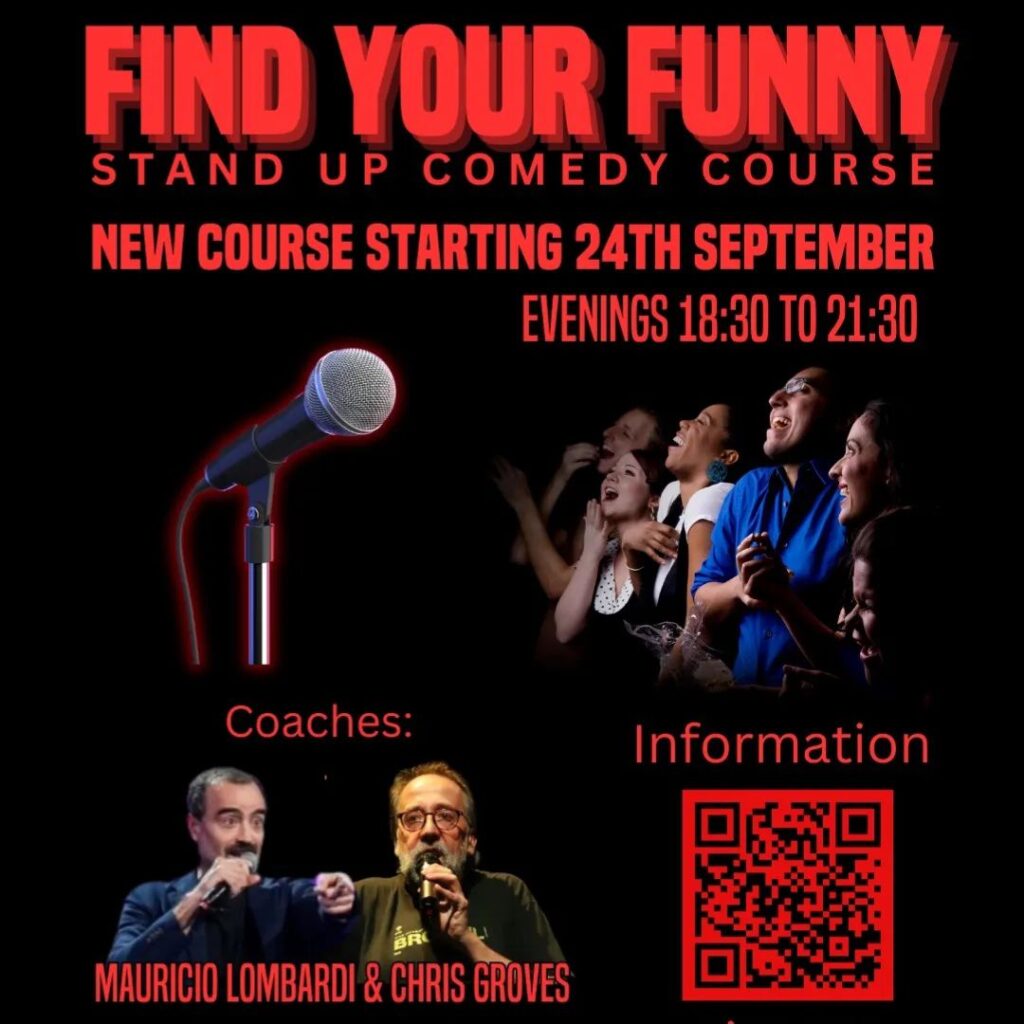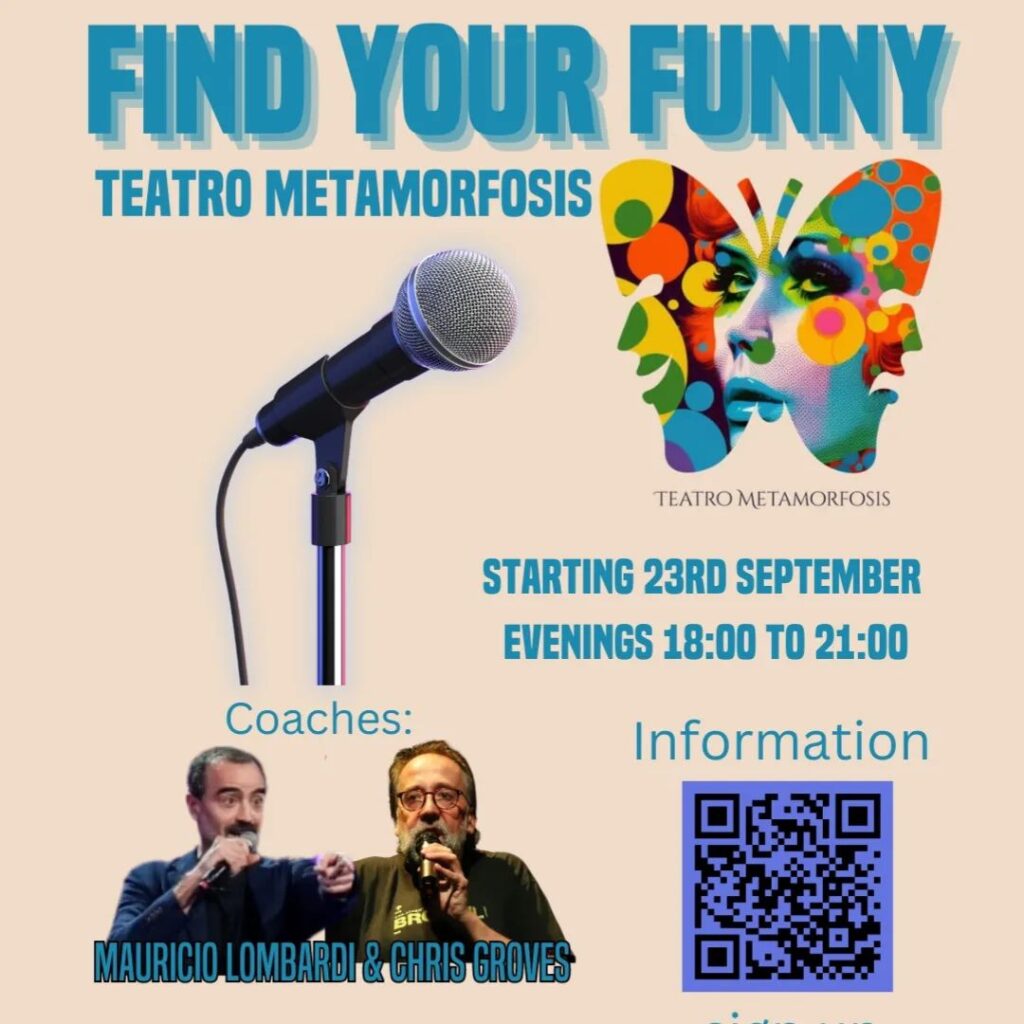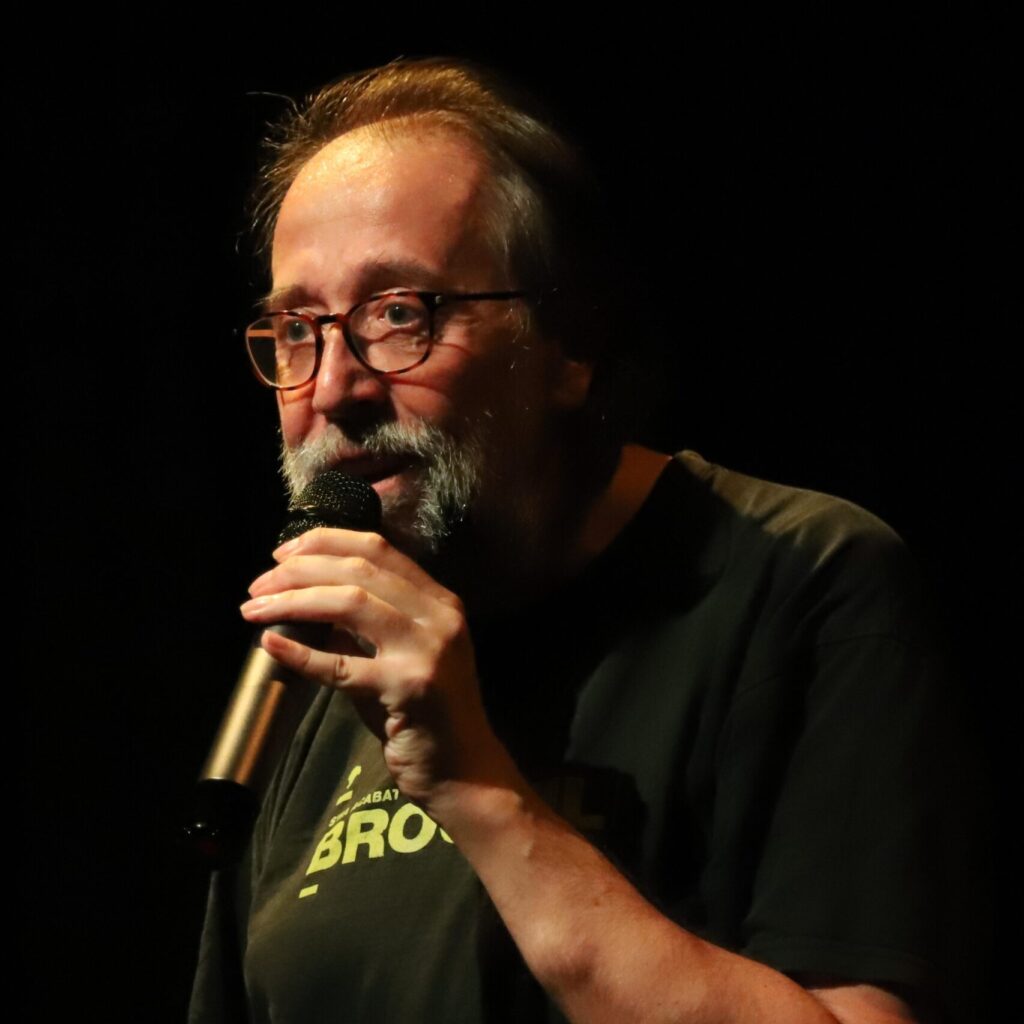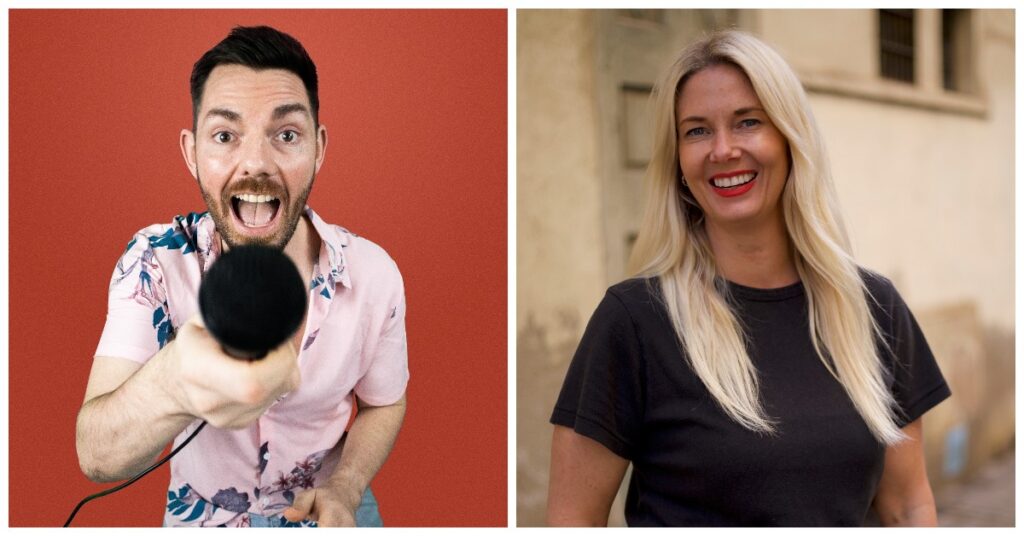Find Your Funny (Exclusive) by Kim Skinner
Between you and me, I’ve always been a tad sceptical about comedy courses, at least when it comes to those for beginners. It’s not that I doubt their value as such; it’s more a slight snobbishness about the purity of learning on the stage at open mics, i.e. the hard, awkward, terrifying way.
There’s certainly no substitute for experience. Whilst watching a ton of comedy definitely helps, and you can learn some theory, there are tough, painful corners which simply cannot be cut.
Can standup comedy be taught?
But can standup comedy actually be taught? My gut tells me that while you can learn the basic structures of a joke and a set, nobody can learn to be funny if they’re just … not. But then, what is ‘funny’? Wildly subjective, that’s what. And there are so many different styles of standup. You don’t see every successful comedian doing classic setup-punchline jokes or using the rule of three. There isn’t always a callback. Maybe it just helps to learn the rules before you learn how to break them.
Chris Groves is a linchpin of the Barcelona comedy scene. He was a self-taught comedian at first (nearly 15 years ago!) and then, after a year or so, he took an intensive weekend course with Logan Murray that he found really useful. These days he performs in English, Spanish, and Catalan, and he co-runs Secret Comedy Club with multiple shows each week in English and Spanish.

Chris has been running comedy courses in Barcelona for around eight years, and this year he began sharing coaching duties with Mauricio Lombardi. There are three main courses per year, with the next one starting on 30 September. For the first time there will be two groups to choose from, meeting on Monday or Tuesday evenings.
“The initial course, Find Your Funny, lasts about three months,” Chris explained. “It has weekly sessions of three hours and, at the end, a showcase where everybody has the chance to perform. A big percentage of people who do the course actually want to keep going with some workshops, so after the initial course there are often drop-in writing sessions and also now a group of five workshops called Step Up Your Stand Up. It’s actually turned into quite a community. There’s a WhatsApp group of over 50 now, where people can see what workshops are coming up and share ideas and jokes.
“The FYF course starts on the basics of why we laugh, how to write a joke, and different formats like one-liners or [the] rule of three. Then we look at structuring a set, finding your own style, and working with an audience. We include some more technical theory, but it’s mainly practical exercises based on creating your own comedy and, above all, having fun and playing!”
It does sound like a lot of fun. So what kind of people sign up for the course? What are their goals and motivations?
Who typically signs up for the comedy course and why?
“There are actually many different reasons people do the course,” Chris added. “For some it’s just a challenge to get outside their comfort zone. Some are more interested in just building their confidence speaking in public. Some non-natives just think it will be a fun and different way to practise English. Others are very determined to become standup comedians, and some are already comedians who perform in other languages, taking the course as a push to start performing in English.”
To what extent, then, does Chris believe comedy can be taught?
“This is the BIG question, haha … I would say you can’t teach people to be funny, but you don’t need to [because] everybody already knows how to be funny instinctively. We help people develop skills to master that and do it on command to groups of people. Hence the name: Find YOUR Funny.”
I’m not sure I totally agree with him on that one point about everyone knowing how to be funny—just as some people are tone-deaf, surely some people are joke-deaf? (I actually just learnt that the scientific name for tone-deafness is amusia. So I hereby dub a lack of sense of humour UNAMUSIA. You’re welcome.)
“I would say I ‘train’ comedians rather than teach them, more like a sport than an academic subject. I ‘teach’ the basics, which gets people going, and then the course is more like training sessions, where they develop their skills under guidance. You can learn and develop the skills yourself, but another outside input from someone with experience can help you do things more professionally and at another level.”
There are several successful Barcelona comedians who have taken the ‘Find Your Funny’ course.
It’s worth mentioning that many fantastic Barcelona comedians have passed through the Find Your Funny ‘classroom’.
“There are notable former FYF ‘alumni’ who now run shows and are among the best in Barcelona. I wouldn’t claim credit for that, but it’s nice to see. Andy Casper, Mila Kopaeva, Irene Meneguzzi, Lluis Vendrell, James Regal, and Mauricio—who won the Funniest FICer competition last year—all did the course. More recently Iain Anderson, who has been doing big things and is already doing a solo show, stands out. The Best Newcomer in last year’s FICer competition, Karen Liu, also did the course.”

It’s an impressive roll call of talented comedians and producers. He mentions several more, including recent intakes and some more alternative comedians that demonstrate the variety of styles he’s seen coming through. This seems to quash the criticism that some people have for comedy courses: that everyone comes out of them doing formulaic sets of jokes-by-numbers. I get the impression that Chris’s strength as a ‘trainer’ lies in bringing people out of themselves while encouraging them to do things their way, and find their own voice.
Mila Kopaeva, officially the hardest working comedian in Barcelona (she’s twice been named Biggest Workhorse at the Comedy Clubhouse annual awards), is co-producer of Midweek Crisis, producer and host of Shut Up, B*tch, and has performed all over Europe. She started standup during the dark days of the pandemic, and a few months later she attended some drop-in sessions with Chris.
“I do believe that good courses with good teachers such as Chris, who’s fantastic, and good theoretical books, are extremely important … you have to be very curious and hungry for this information if you start standup. But I [also] believe that you have to go onstage from day one, as soon as possible, and just keep on going, together with [that] theoretical education. The course is beneficial because they give you information about techniques, how to write jokes, different methods, rhythm, timing … tips about how to perform, even how to use the microphone … All that stuff is important, and it doesn’t just come to you out of the blue; somebody needs to tell you that. And you do exercises, discuss them with the group, and Chris gives very good feedback … This is what I found very valuable.”
Chris Newport is a recent Find Your Funny ‘graduate’, having completed the course in June. He went to the Edinburgh Festival to perform at Found Our Funny — Barcelona Comedy Tapas alongside several of his coursemates (and Chris Groves, of course). The chance to perform at the Fringe is offered as part of the FYF course and it’s a huge draw.
“I’ve wanted to do standup comedy for about 25 years. This course seemed a good way to push me to finally do it. I also had a friend who had graduated from the course and recommended it. The majority of it was really good and it 100% made my show better … The most valuable thing I learnt was to have confidence in what you are saying and people will buy into it.”
Would he ever have got onstage without having done the course, I ask.
“I would like to think yes, but the course definitely gave me the push I needed to do it.”
So, if you want to try standup comedy without procrastinating it for a decade or two; or you want to learn some comedy theory and techniques, and practise in a safe environment with feedback from experienced comedians; OR you want the chance to perform at one of the biggest performing arts festivals in the world when you’re just a couple of months into your comedy career; then Chris Groves’ course is a fine choice.
Can comedy classes make you funny? Possibly not. But if there’s any funny in you, Chris and Mauricio will definitely help you find it, and give you the tools to shape it into something you can be proud of.




